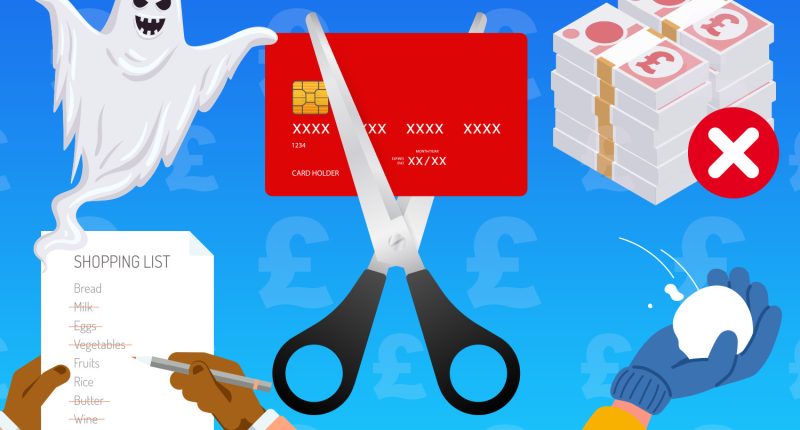CHRISTMAS can leave households with big debts to pay off – but there are ways to clear what you owe within just a few weeks.
Around 4million people relied on credit to cover costs this Christmas, and 19% of those borrowing expect it’ll take them more than a year to repay the credit, according to research by StepChange.
If you’ve been left in financial dire straits because you’ve overspent this Christmas, don’t panic.
There are specific methods and tricks you can use to help clear as much debt as possible and stop it from snowballing.
Finance experts have shared their top tips with The Sun to reveal how you can keep lenders at bay and pay off your debt this January.
Below we reveal the seven steps to follow if you find yourself in debt this New Year.
READ MORE IN MONEY
Take out a 0% balance transfer credit card and cut it up straight away
Balance transfer credit cards are a great idea if you have debt spread across a few different cards or if your interest rate is high.
Alice Haine, personal finance analyst at Bestinvest, explained: “Sign up for a 0% balance transfer credit card, transfer your existing debts onto it, set up a direct debit to repay a set amount each month and then cut the card up.”
A 0% balance transfer card applies zero interest to the outstanding balance for a set period, with terms as long as 28 months.
Alice continued: “This can be enough time to clear a large balance without paying heavy interest charges but if you run up fresh debt on the card, then interest can apply – that’s why you should cut it up.
Most read in Money
“If you don’t clear it, simply open another 0% card before the current deal expires and transfer the remaining balance to that.”
These cards mean you can move the balance from other cards onto a new one, and you pay no interest for a set period.
You’ll stop paying interest meaning you’ll pay less overall and clear the debt quicker, because money saved on interest can be used to erode the original borrowing
Alice did warn though that some cards charge a balance transfer fee, so compare options before you apply.
This can be a set amount or a percentage of the outstanding balance, so check it’s worth it first.
You’ll also want to make a note of the date the interest-free period ends so you can aim to have it paid off, or switch to another card with another 0% offer.
Plus remember to always make the minimum repayments.
You should always use an eligibility calculator before applying, that’s because every credit card application leaves a mark on your credit file and can affect your credit score.
You can find these checkers on comparison sites like Compare the Market, Go Compare and MoneySupermarket, or on the Money Saving Expert website.
Go cold turkey and do a ‘no-spend’ day, week, month or year
“Going extreme” and trying a no spend period can be a great way to kickstart your fight against debt, Alice suggests.
“Try a no-spend day, week, month, or, if you are brave enough, year.
“This is where you don’t spend on anything other than essential bills and what you have budgeted for.”
Alice explained that sometimes just breaking the cycle of frittering away money on whatever you fancy can be enough to retrain your brain to adopt much healthier spending habits that last a lifetime.
She added: “To help you along, pop your credit card in a plastic box filled with water and put it in the freezer to prevent you using it.
“A simpler option is to request a ‘pause’ on new transactions with your credit card provider.”
You could also try deleting shopping apps on your phone or to organise free days out for you and your family.
If you can, why not try walking instead of driving to save cash on fuel.
We spoke to one mum who manage to save £600 doing a no-spend month, showing just how much you could put away in a short space to pay off Christmas borrowing.
Don’t be afraid to ask for debt advice
There is no shame in asking for help either, sometimes even opening up to someone else can be enough.
Simon Trevethick, head of communications at StepChange debt charity that some might opt not to reach out.
He said: “It may seem obvious, but to many out there, debt advice doesn’t come across as an immediate option to people.
“Christmas can be a time of joy and celebration, but it can also put great pressure on us financially, particularly this year amid the cost of living crisis.”
If you’re worried about your finances or experiencing problem debt, a charity like StepChange can help with free and impartial debt advice.
Groups like Citizens Advice and National Debtline can also help you manage your debt and negotiate with your creditors.
You should always have a look at what free options are available for managing debt before you turn to a private firm for support.
There’s also a specific government scheme to help manage debt called Breathing Space, which gives you the right to legal protection from creditors for up to 60 days.
The FCA said consumers can get free and impartial advice from the MoneyHelper website or by telephone on 0800 138 7777.
Don’t ghost your lenders – face up to your problems
Another important tip is to not run away from your debt, Alice said.
She explained: “If you are at risk of defaulting any time soon or have already missed a due date for a mortgage repayment or loan, ignoring the lenders you owe money to won’t make the problem go away.”
Instead, Alice urges that it’s important to be proactive and ask each provider for help.
She said: “Most lenders recognise that people’s finances are still squeezed by the cost of living crisis.
“Provided you are honest about your financial struggles, they are likely to be amenable.”
A good lender should support you through a period of financial instability by offering favourable repayment terms, such as a payment holiday, reduced payments or an affordable repayment plan.
“But you must be upfront about your problems rather than ignoring them to secure a deal,” Alice said.
‘Debt snowball’ or ‘debt avalanche’ strategies
The New Year could also be a prime time to kickstart a new financial plan.
Alice proposed some easy ways to do this like the debt snowball or avalanche methods.
Both are effective ways to clear debt such as credit cards and loans.
But whichever you choose, make sure to put priority debts and bills first – these are ones that have the most serious consequences if not paid, like councils tax or rent.
Alice said: “First list all your debts and strive to make minimum payments on all of them bar one.
“On that final debt, pay more than the minimum requirement each month – dedicating as much as possible, but not too much as you don’t want to build up more debt.
“Then once the card or loan is cleared, target the next balance until all the debts are gone.”
The difference between the two strategies is that with the snowball method, you target the smallest debt first and the biggest debt last – as the smaller liabilities will be easier to clear offering encouragement along the way.
On the other hand, the avalanche approach goes from the other end of the scale.
“The avalanche approach targets the highest-interest debt first and the lowest-interest debt last, reducing the total cost of your liabilities,” Alice explained.
Resist borrowing more
To avoid increasing your debt pile even further it’s important to avoid borrowing further.
Danial Bagley money adviser at National Debtline explained that households should opt to not give into the pressure.
He said: “There can be a lot of pressure to spend at this time of year, but borrowing more could be storing up problems for later.
“If you are considering using a buy now, pay later option make sure you can afford any repayments when they are due. ”
Fresh figures from the FCA revealed recently that more people are turning to Buy Now, Pay Later (BNPL).
An estimated 14million people made use of unregulated borrowing at least once in the six months to January 2023, according to the Financial Conduct Authority.
It found that frequent users of BNPL are more likely to be in financial difficulties, such as having rising debts or missed bill payments.
BNPL is not regulated by the FCA and borrowers are not protected in the same way as other borrowing such as loans and credit cards.
So it’s important to be careful if you’re tempted to shop using the method.
Get regimented with a budget that follows the 50-30-20 rule
Budgeting is a key strategy for clearing debt efficiently.
Alice said: “Structure is always good when clearing debt, with the 50-30-20 method, you direct 50% of your income towards essential living costs, such as household bills, food and commuting.
“Then 30% to your ‘wants’ such as going out, shopping trips, gym memberships and holidays, and 20% towards paying off debt, saving for short and medium-term goals, and investing for the long-term.”
Read more on The Sun
Of course, these percentages can be moved around depending on your priorities,
That means that 30% could be directed towards debts and savings, 30% to wants and 40% to needs.
You can also join our new Sun Money Facebook group to share stories and tips and engage with the consumer team and other group members.










